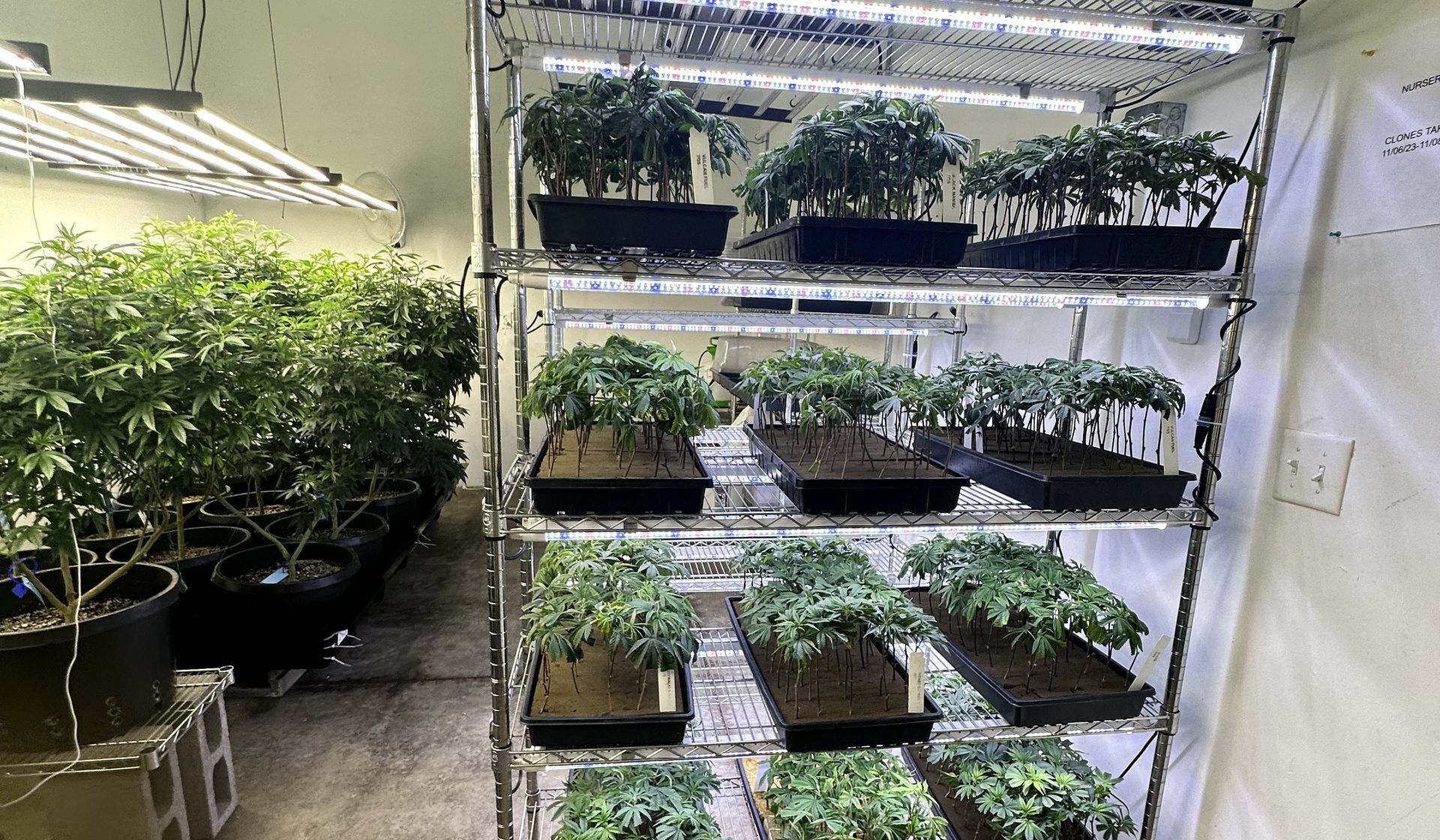The Role of Education in The Growth of the Cannabis Industry
The Role of Education in Cannabis Industry Growth
The cannabis industry is evolving at an unprecedented pace, driven by a wave of legalization efforts, shifting public perception, and increasing scientific research. However, despite the potential of this multi-billion-dollar market, its long-term success hinges on one crucial factor: education. From consumer education to workforce training and the establishment of comprehensive educational programs, knowledge is the cornerstone that will propel the cannabis industry into a mature, sustainable, and legally compliant market.

In this article, we explore the essential role that education plays in the growth of the cannabis industry, examining its impact on consumers, workers, and the broader development of the industry. Whether you are a cultivator, a business owner, a policymaker, or simply a consumer, understanding the importance of education in this rapidly growing sector is essential.
Consumer Education: Building Trust and Knowledge
Addressing Misconceptions and Stigma
Consumer education is perhaps the most visible and immediate aspect of cannabis industry growth. Historically, cannabis has been stigmatized due to its association with illegal activities and widespread misinformation. Even as more regions legalize cannabis, many consumers remain uninformed or misinformed about its potential benefits, risks, and proper usage.
To overcome these challenges, the industry needs to invest heavily in consumer education campaigns. These initiatives should focus on correcting misconceptions, providing evidence-based information about cannabis, and debunking myths. For example, many consumers still view cannabis as a dangerous substance with limited medical value, despite mounting scientific evidence supporting its therapeutic benefits. Educational efforts aimed at reducing stigma and increasing knowledge will help foster trust in the industry and encourage responsible consumption.
Promoting Safe and Informed Consumption
The rapid expansion of the cannabis market has resulted in a dizzying array of products, from smokable flower to edibles, tinctures, concentrates, and topicals. For many new consumers, navigating this wide range of options can be overwhelming, leading to confusion or misuse. Consumer education is essential to helping individuals understand how to choose the right products, determine appropriate dosages, and use cannabis safely.
Effective educational programs can empower consumers with information about:
- Cannabinoids (THC, CBD, etc.): Understanding the difference between psychoactive and non-psychoactive compounds.
- Consumption Methods: Educating users on the varied onset times and effects of smoking, vaping, consuming edibles, or applying topicals.
- Dosage Awareness: Helping consumers avoid overconsumption by educating them about appropriate dosages and the risks of taking too much.
- Lab Testing and Quality Assurance: Teaching consumers to seek lab-tested products and understand labeling information, ensuring they choose safe and high-quality cannabis.
Companies that invest in consumer education initiatives not only contribute to public safety but also enhance customer loyalty, as well-informed consumers are more likely to trust and return to reputable brands.
Workforce Training: Creating a Skilled Labor Force
Professionalizing the Industry
As the cannabis industry transitions from the shadows of prohibition into a legitimate, regulated market, there is a growing demand for a skilled and knowledgeable workforce. However, the unique nature of the cannabis sector means that traditional educational institutions have historically offered little in the way of formal training. To meet this demand, cannabis-specific educational programs and workforce training initiatives are essential.
The cannabis industry requires expertise across a wide range of disciplines, including agriculture, horticulture, extraction techniques, product development, regulatory compliance, marketing, and retail. Developing specialized training programs for these areas is critical for the industry's growth and long-term success.
Addressing Compliance and Safety
One of the most important aspects of workforce training is ensuring that employees understand and comply with the complex web of local, state, and federal regulations governing the cannabis industry. From cultivation to retail, every sector of the industry is subject to strict rules regarding product safety, packaging, labeling, and distribution. Failure to comply with these regulations can result in costly fines, product recalls, or even the revocation of business licenses.
Workforce training programs should emphasize the importance of regulatory compliance and educate employees on the specifics of these laws. For instance, budtenders—the frontline workers in cannabis dispensaries—need to be well-versed in state-specific regulations, as well as the products they sell. This knowledge enables them to provide accurate and helpful information to consumers, while ensuring that their business remains compliant with legal standards.
In addition to compliance, safety is a key concern in the cannabis industry. From handling potentially hazardous chemicals during extraction processes to ensuring safe cultivation practices, a well-trained workforce is critical to maintaining the health and safety of both employees and consumers.
Promoting Diversity and Inclusion
The cannabis industry presents a unique opportunity to promote diversity and inclusion within its workforce. Historically, marginalized communities—particularly people of color—have been disproportionately affected by cannabis-related arrests and convictions. As the legal market grows, there is a moral imperative to ensure that these communities have access to the economic opportunities created by legalization.
Education and workforce training programs play a pivotal role in achieving this goal. By providing targeted training and support to individuals from historically disadvantaged backgrounds, the cannabis industry can promote social equity and create a more diverse and inclusive labor force. Programs such as scholarships, apprenticeships, and mentorship opportunities can help bridge the gap and ensure that the cannabis industry reflects the diversity of the communities it serves.
Educational Programs: Laying the Foundation for Industry Development
Cannabis in Academia: A New Frontier
Formal educational programs, particularly at the collegiate and vocational levels, are crucial for the long-term development of the cannabis industry. Over the past few years, a growing number of universities and colleges have begun offering courses and degree programs focused on cannabis, ranging from horticulture and plant biology to law, business, and pharmacology.
These programs provide students with the in-depth knowledge and skills they need to pursue careers in the cannabis industry. For example, a student studying cannabis horticulture might learn about the intricacies of growing cannabis under different conditions, pest management, and plant genetics. Meanwhile, students studying cannabis law or business may focus on the regulatory landscape and the unique challenges faced by cannabis entrepreneurs.
By incorporating cannabis into mainstream academia, these programs not only help create a pipeline of skilled professionals but also lend legitimacy to the industry. As more educational institutions embrace cannabis as a subject of study, the industry will benefit from increased research, innovation, and professionalization.
Research and Development
One of the key drivers of innovation in the cannabis industry is scientific research. However, due to cannabis' classification as a Schedule I substance under U.S. federal law, research into the plant's potential benefits and risks has historically been limited. As legalization expands, there is a growing need for robust research and development (R&D) efforts to better understand the cannabis plant and its myriad applications.
Educational institutions play a critical role in advancing cannabis research. Universities and research centers are uniquely positioned to conduct studies on cannabis cultivation, cannabinoid pharmacology, and the plant's medical uses. By fostering partnerships between the cannabis industry and academic researchers, educational programs can help drive innovation and expand our understanding of cannabis.
For instance, research into cannabinoids like CBD and THC has already yielded valuable insights into their potential therapeutic applications, from pain relief to epilepsy treatment. However, there is still much to learn about lesser-known cannabinoids, such as CBG and CBN, as well as the entourage effect—the synergistic interaction of various cannabis compounds.
Certifications and Continuing Education
In addition to formal degree programs, the cannabis industry also relies on certifications and continuing education courses to keep professionals up-to-date on the latest developments in the field. Given the rapid pace of change in the industry, ongoing education is essential for staying competitive and maintaining compliance with evolving regulations.
Certification programs, such as those offered by organizations like the Cannabis Training University or the National Cannabis Industry Association, provide industry professionals with the specialized knowledge they need to succeed in their roles. For example, certifications for cannabis extraction technicians, budtenders, or compliance officers ensure that employees are equipped with the necessary skills and knowledge to perform their jobs safely and effectively.
Continuing education is equally important for professionals who want to stay informed about the latest trends, technologies, and regulatory changes. This ongoing learning process is essential for maintaining a competitive edge in an industry that is constantly evolving.
The Role of Education in Shaping Cannabis Policy
Informing Public Policy and Regulation
Education doesn't just benefit consumers and workers; it also plays a critical role in shaping the policies and regulations that govern the cannabis industry. Policymakers rely on accurate, evidence-based information to make informed decisions about cannabis legalization, taxation, and regulation.
Educational programs and research institutions can provide lawmakers with the data they need to craft policies that promote public health, safety, and economic growth. For example, studies on the economic impact of cannabis legalization can help policymakers understand the potential benefits of a regulated cannabis market, including job creation and tax revenue. Similarly, research on the medical applications of cannabis can inform decisions about patient access and the regulation of medical cannabis programs.
Advocacy and Public Awareness
Education is also a powerful tool for advocacy and public awareness. As more people become educated about cannabis, its uses, and its potential benefits, public support for legalization and responsible regulation continues to grow. Grassroots organizations, advocacy groups, and industry associations all play a role in educating the public and policymakers about the importance of sensible cannabis policies.
For example, advocacy groups have successfully used education to highlight the racial disparities in cannabis-related arrests and push for social equity programs in newly legalized states. By raising awareness about these issues, educational initiatives can help shape public opinion and drive meaningful policy changes.
Conclusion: The Path Forward
As the cannabis industry continues to grow and evolve, education will be the key to unlocking its full potential. From educating consumers about safe and informed use to training a skilled workforce and fostering research and innovation, education is essential to building a sustainable, responsible, and thriving cannabis industry.
The future of the cannabis market depends not only on regulatory changes and business growth but also on the industry's ability to invest in education at all levels. By prioritizing education, the cannabis industry can overcome challenges, seize new opportunities, and pave the way for a brighter, more informed future.
Cannabis Industry Education Quiz
Instructions:
- This quiz contains 5 multiple-choice questions about cannabis industry education.
- You have 30 seconds to answer each question.
- Your score and explanations will be provided at the end.
- Click "Start Quiz Now" when you're ready to begin!










